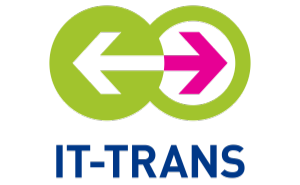HERE YOU WILL FIND THE LATEST NEWS AND DEVELOPMENTS RELATING TO IT-TRANS.
Welcome to the IT-TRANS news page!
Find out about the latest developments and trends in the world of public transport on the IT-TRANS news page. As the leading platform for innovations and technologies in the public transport sector, we offer you exclusive insights, important industry information and exciting updates from our events.
Stay informed, stay connected and shape the future of public transport with the IT-TRANS news page!
Thanks to intelligent forecasting technology, mobility apps can now proactively include sharing services in route planning – making transfers significantly more reliable. Learn more about the DAKIMO project.
How C2C-Bridge vehicles are revolutionizing local transport: Autonomous on-demand cabs as a sustainable, smart mobility solution of the future.
Electrification of public transport bus fleets
“Start-ups in focus” series: Improving mobility in rural areas with ridesharing and community buses
‘Start-ups in focus’ series: Flexible bus services make public transport more attractive in areas of previously low demand
‘Start-ups in focus’ series: Digital mobility budget ensures more flexibility for employees
New type of logistics concept shifts freight transport from road to tram tracks
‘Start-ups in focus’ series: enderco's core expertise is customer data verification
Today, Federal Transport Minister Dr. Volker Wissing and Winfried Hermann, Transport Minister of the State of Baden-Württemberg, opened IT-TRANS, the leading international trade fair and conference for digitalization in local public transport.
The Karlsruhe Mobility Lab will be at IT-TRANS – and hosting live pitches for the Future Mobility Award
Technology pioneer and AI scientist adviser Inma Martinez is our IT-TRANS keynote speaker
Network presents current projects on future mobility at the joint stand
Interview iwth the founders of the women in Mobility Hub Baden
Whether apps for booking tickets or software for controlling passenger information services: Digital solutions from transport companies already have a lot to offer customers. But digitalization can do more. Smart solutions can also make internal processes easier. There are now a number of good examples of this.
Karlsruhe: Home of IT-TRANS ... and capital of Female Empowerment D, E&I, i.e. "diversity, equality and inclusion" is the formula for equal opportunities and participation, especially in a professional context.
Public transport offers great potential for making people's mobility behavior more environmentally friendly and sustainable.
The trains of the Munich S-Bahn, whose technology, design and equipment were recently presented, will set new standards in this area.
Industry experts discuss the pros and cons of the Deutschlandticket
